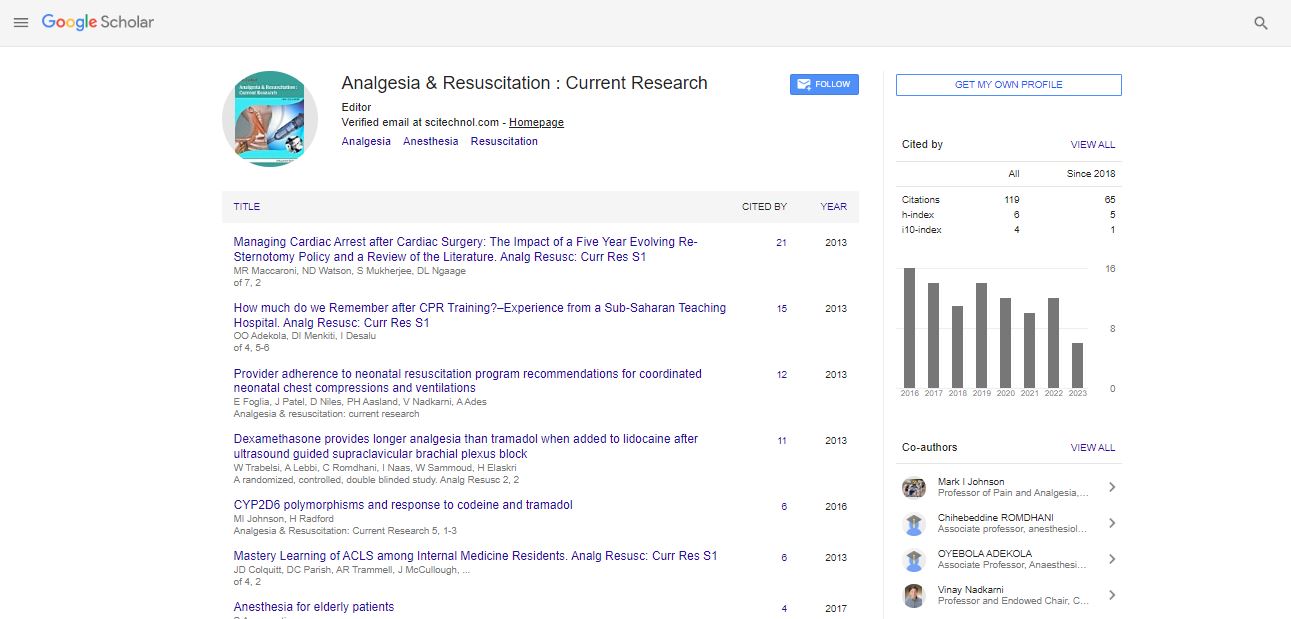Perspective, Analg Resusc Curr Res Vol: 12 Issue: 4
Comprehensive Approaches to the Management of Painful Syndromes
Donghwan Lee*
1 Department of Anesthesia, Harvard Medical School, Boston, USA
*Corresponding Author: Donghwan Lee,
Department of Anesthesia, Harvard
Medical School, Boston, USA
E-mail: leewan@mgh.edu
Received date: 22 November, 2023, Manuscript No. ARCR-24-128593;
Editor assigned date: 24 November, 2023, PreQC No. ARCR-24-128593 (PQ);
Reviewed date: 08 December, 2023, QC No. ARCR-24-128593;
Revised date: 15 December, 2023, Manuscript No ARCR-24-128593 (R);
Published date: 22 December, 2023, DOI: 10.4172/2324-903X.1000137.
Citation: Lee D (2023) Comprehensive Approaches to the Management of Painful Syndromes. Analg Resusc: Curr Res 12:4.
Description
Painful syndromes, often characterized by persistent and complex pain conditions, can significantly impact the quality of life for those affected. The management of these syndromes requires a comprehensive approach that goes beyond traditional pain relief strategies. Painful syndromes encompass a spectrum of conditions, ranging from neuropathic pain and fibromyalgia to Complex Regional Pain Syndrome (CRPS) and migraines. Unlike acute pain, which serves as a warning signal, these syndromes involve persistent pain that can be debilitating and challenging to treat. Managing painful syndromes requires a nuanced understanding of the underlying mechanisms, contributing factors, and the unique experiences of individuals facing these conditions. A comprehensive approach to the management of painful syndromes begins with a thorough and multidimensional assessment. Beyond assessing the intensity of pain, healthcare professionals need to consider the physical, psychological, and social aspects of the individual's experience. Pain is not solely a sensory experience; it is intertwined with emotional well-being, cognitive function, and overall quality of life.
The impact of painful syndromes extends beyond the physical realm, affecting mental health and social interactions. Comprehensive management involves providing psychosocial support to address the emotional toll of chronic pain. Counseling, cognitive-behavioral therapy, and support groups can offer valuable tools for individuals to cope with the psychological challenges associated with painful syndromes. While medications play a crucial role in pain management, a comprehensive approach incorporates nonpharmacological interventions to address the multidimensional nature of painful syndromes. Physical therapy, acupuncture, massage, and mindfulness-based interventions have shown efficacy in reducing pain and improving functional outcomes. These approaches not only target the physical manifestations of pain but also contribute to the overall well-being of individuals facing painful syndromes.
Comprehensive pain management involves a focus on holistic lifestyle modifications. This includes optimizing sleep hygiene, promoting regular physical activity, and addressing nutritional factors that may contribute to pain. Lifestyle modifications contribute to the overall health of individuals with painful syndromes and can enhance the effectiveness of other therapeutic interventions. While a comprehensive approach integrates non-pharmacological interventions, pharmacological strategies remain a cornerstone of pain management for many individuals with painful syndromes. Medications such as analgesics, anti-inflammatory drugs, and neuromodulators may be prescribed based on the specific characteristics of the syndrome. The goal is not only to alleviate pain but also to improve overall function and quality of life.
Integrative medicine, which combines conventional medical treatments with complementary and alternative therapies, plays a significant role in the comprehensive management of painful syndromes. Integrative approaches may include acupuncture, chiropractic care, herbal supplements, and mind-body practices. The synergy of multiple therapeutic modalities can provide a more holistic and individualized approach to pain management. A comprehensive approach to managing painful syndromes involves empowering individuals through education and self-management strategies. Providing information about the nature of their condition, teaching coping skills, and involving patients in shared decision-making enhance their ability to actively participate in their care. Empowered patients are better equipped to manage their symptoms and improve their overall well-being.
Despite the promise of comprehensive approaches, challenges exist in implementing these strategies. Access to multidisciplinary care, affordability of non-pharmacological interventions, and the need for specialized expertise pose barriers to comprehensive pain management. Addressing these challenges requires a concerted effort from healthcare systems, policymakers, and the healthcare community to prioritize and integrate comprehensive approaches into standard care.
 Spanish
Spanish  Chinese
Chinese  Russian
Russian  German
German  French
French  Japanese
Japanese  Portuguese
Portuguese  Hindi
Hindi 
